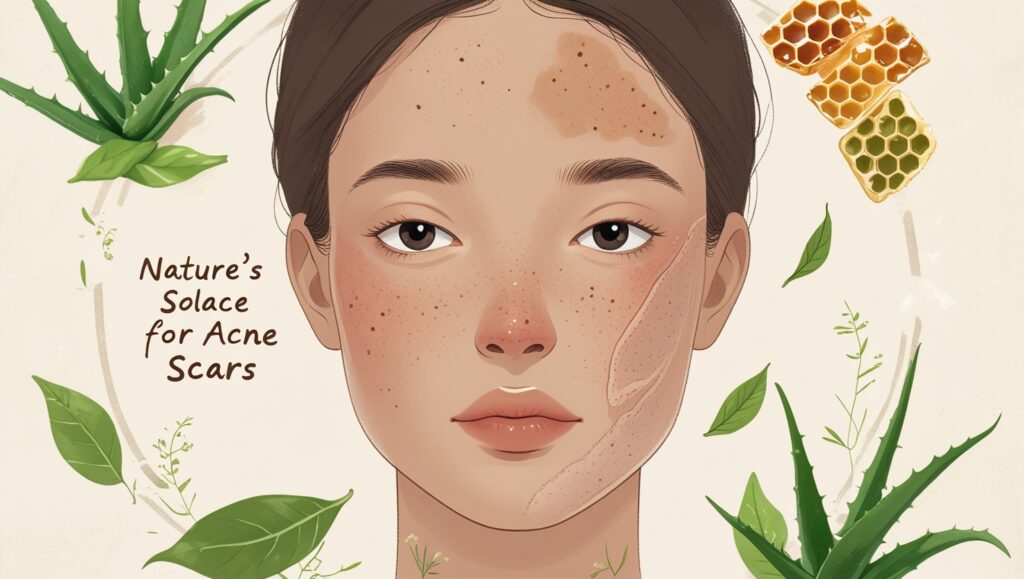Table of Contents
- Introduction
- Understanding Acne Scars
- Why Choose Home Remedies?
- Top 10 Home Remedies to Fade Acne Scars
- How to Use Each Remedy Safely
- Additional Natural Tips for Scar Reduction
- Real-Life Stories and Results
- Common Mistakes to Avoid
- When to See a Dermatologist
- Conclusion and Next Steps
1. Introduction
Acne scars can be just as frustrating as acne itself. After your breakouts clear, they leave behind reminders that take months—or even years—to fade. While professional treatments are effective, many people turn to home remedies for safe, affordable solutions.
In this guide, you’ll learn which home remedies are best for reducing acne scars, how to use them properly, and what to expect. We’ll cover real-life results, helpful tips, and when it might be time to call in a professional.
2. Understanding Acne Scars
Types of Acne Scars
- Atrophic scars: Shallow indentations in the skin (ice pick, boxcar, rolling scars)
- Hypertrophic scars: Raised, firm scars
- Post-inflammatory hyperpigmentation (PIH): Dark spots left behind after inflammation
Why Scars Form
Scars develop when the skin’s healing process after acne is disrupted or excessive. Picking at pimples, severe cystic acne, or repeated inflammation can increase your chances of scarring.
3. Why Choose Home Remedies?
Benefits Over Chemical Treatments
- Cost-effective
- Fewer side effects
- Accessible ingredients
- Gentle on sensitive skin
Precautions Before Trying Natural Solutions
- Always do a patch test first
- Avoid remedies that sting or cause irritation
- Consistency and patience are key
4. Top 10 Home Remedies to Fade Acne Scars
1. Aloe Vera
- Naturally anti-inflammatory and soothing
- Encourages skin regeneration
How to Use: Apply fresh aloe vera gel directly to scars twice daily.
2. Honey
- Natural humectant with antibacterial properties
- Supports healing and reduces redness
How to Use: Dab raw honey onto scars and leave for 15–20 minutes, then rinse.
3. Lemon Juice
- Contains vitamin C, helps lighten dark spots
Caution: Can make skin photosensitive; only use at night and follow with sunscreen.
4. Apple Cider Vinegar
- Acts as a natural toner
- Helps exfoliate dead skin and lighten pigmentation
How to Use: Dilute 1:3 with water and apply with a cotton pad.
5. Baking Soda
- Mild exfoliant that helps fade PIH scars
How to Use: Mix with water to form a paste, use once a week.
6. Coconut Oil
- Rich in antioxidants and fatty acids
- Best for dry skin types
How to Use: Massage a small amount into scars before bed.
7. Tea Tree Oil
- Antibacterial, anti-inflammatory
- Useful for both active acne and fading marks
How to Use: Dilute with a carrier oil (e.g., jojoba), apply directly on spots.
8. Turmeric
- Curcumin has healing and brightening effects
How to Use: Mix with honey or yogurt for a mask, apply for 15 minutes.
9. Green Tea Extract
- High in antioxidants
- Reduces inflammation and calms skin
How to Use: Use cooled green tea bags on affected areas or mix with aloe gel.
10. Potato Juice
- Natural bleaching agent
How to Use: Grate a raw potato, extract juice, apply to scars for 10–15 minutes.
5. How to Use Each Remedy Safely
- Limit application to once or twice a day
- Always apply sunscreen during the day to prevent further pigmentation
- Avoid using multiple remedies at once
6. Additional Natural Tips for Scar Reduction
Diet and Hydration
- Drink plenty of water daily
- Eat vitamin-rich foods (C, E, A, and zinc)
Gentle Skincare Routine
- Use non-comedogenic, fragrance-free products
- Don’t scrub aggressively—exfoliate gently
Sun Protection
- Use SPF 30 or higher daily
- Wear hats or stay in the shade
7. Real-Life Stories and Results
Many people have reported visible results within a few weeks of consistent application. For example:
- Priya, 24, saw her dark spots fade after using turmeric masks twice a week
- Jason, 30, found aloe and tea tree oil reduced both active acne and leftover marks
Remember, results may vary depending on skin type and severity.
8. Common Mistakes to Avoid
- Overusing lemon juice without dilution
- Applying essential oils without carrier oil
- Switching remedies too quickly
- Ignoring sun protection
9. When to See a Dermatologist
If home remedies aren’t working after 2–3 months, or if you have:
- Deep pitted scars
- Worsening pigmentation
- Skin irritation from treatments
Consider professional options like:
- Chemical peels
- Microneedling
- Laser resurfacing
- Prescription creams
10. Conclusion and Next Steps
Home remedies can be a gentle and cost-effective way to reduce acne scars. The key is consistency, patience, and sun protection. While these methods may not work overnight, they can significantly improve skin appearance over time.
Take Action Today:
- Choose 1–2 remedies and apply regularly
- Maintain a healthy skincare routine
- Monitor your progress and adjust as needed
Clear skin doesn’t happen in a day—but with the right natural remedies, you’re one step closer to a scar-free glow!
Visit for more :- Greakstive
External References & Further Reading:
- 4 Natural Products to Get Rid of Acne Scars
- Home Remedies To Remove Acne Naturally
- Acne scar treatment options

